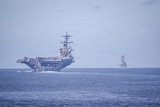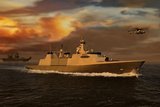DIMDEX 2016: Qatar spending spree
Additional maintenance, equipment and training MoU’s were signed for the Qatar Emiri Armed Forces on 30 March.
The contracts were with companies such as MBDA, Thales and Rolls Royce/MTU and all involved in the multi-million dollars deals.
The announcements for ten deals totalling some 4.2 billion Qatari rials (approximately $1.16 billion), follow a similar MoU signing on Tuesday for the procurement of 24 Rafale fighter jets from Dassault worth €6.7 billion (approximately $7.58 billion).
Signing on 29 March on behalf of Qatar was Dr Khalid Bin Mohamed Al-Attiyah minister of state for defence affairs and behalf of France was their minister of defence Jean-Yves
Already have an account? Log in
Want to keep reading this article?
More from Naval Warfare
-
![UK’s Fleet Solid Support ship programme deemed on track despite steel supply concerns]()
UK’s Fleet Solid Support ship programme deemed on track despite steel supply concerns
Shipbuilders are saying the programme is going ahead on time as the government estimates 7.7 million tonnes of steel are needed for 2026 infrastructure projects.
-
![As Indonesia doubles up its order, who else is looking at the Arrowhead 140 frigate design?]()
As Indonesia doubles up its order, who else is looking at the Arrowhead 140 frigate design?
The adaptable design of Babcock’s Arrowhead 140 frigate, already selected by the UK Royal Navy and Poland, has led to more orders from Indonesia while other countries continue to weigh it up.
-
![US Navy to invest more than $700 million in laser-related R&D efforts in FY2026]()
US Navy to invest more than $700 million in laser-related R&D efforts in FY2026
The US Navy’s acceleration of its laser weapon development initiatives reflects a decisive shift towards ultimately having a “laser on every ship” across tomorrow’s surface fleet.





















